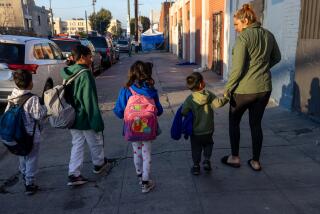Practical or Political?
- Share via
It’s hard to sort out what’s political and what’s practical when it comes to the Los Angeles City Council’s reluctance to include Pacoima in its application for a multimillion-dollar federal youth grant. But it’s clear that, either way, the young people of Pacoima come out the losers.
The U.S. Department of Labor is offering 25 Youth Opportunities Grants nationwide. Each will provide $12 million a year, or up to $48 million over five years, to help young people between 14 and 21 stay in school and get jobs.
Los Angeles officials have included Watts and East L.A. in their grant application but they argue that although Pacoima is technically eligible, including the northeast San Fernando Valley community would make the application less competitive.
This particular grant program, they say, favors communities with concentrated poverty. Watts has 57% of its youth in poverty, according to 1990 census data, and East L.A., 47%. Pacoima, at about 37%, would lower the aggregate poverty level and jeopardize the city’s chances of snagging one of the grants.
The math is correct. But by that argument, Watts would be more competitive without East L.A., which was added at the last minute when its councilman, Mike Hernandez, intervened.
When Pacoima’s councilman, Alex Padilla, tried to add Pacoima to the application, the majority of the council voted to send the request to committee--not a promising sign, given the grant’s Thursday deadline.
Would adding Pacoima really hurt the grant’s chances, or does newcomer Padilla merely lack Hernandez’s clout? Practical or political?
With Democrats in the White House eager to court California voters, it’s hard to imagine Los Angeles not getting such a grant, with or without Pacoima, for purely political reasons. But then, it was hard to imagine Los Angeles losing its first bid to be designated a federal empowerment zone back in 1994, since that program was developed in response to the 1992 riots. Yet the city’s original empowerment zone application was denied for being vague and incomplete. Empowerment zones were not granted until last year.
Council members, if they’re doing their job right, have to weigh what’s good for their district against what’s good for the city as a whole. But they have to remember that Pacoima is part of the whole.
A grant that targets only the kind of high-density poverty found in inner cities is out of touch with the changes that are happening in the suburbs. Older, inner-ring suburbs like the Valley are no longer the bucolic bedroom communities of the Brady Bunch. They have traffic congestion and pollution and slums and gangs.
Although politicians--particularly those in Washington, D.C., apparently--continue to see suburbs as havens of affluent soccer moms, the reality is that they are a mix of classes and races and languages. Just because the suburbs are geographically more sprawling and their poverty less concentrated doesn’t make their poor any less in need of education and job training.
Hernandez offered to help Padilla search for federal grants that would better suit Pacoima. He and the other council members need to follow through, sooner rather than later. And not for Padilla, but for the young people of Pacoima.
More to Read
Sign up for Essential California
The most important California stories and recommendations in your inbox every morning.
You may occasionally receive promotional content from the Los Angeles Times.













